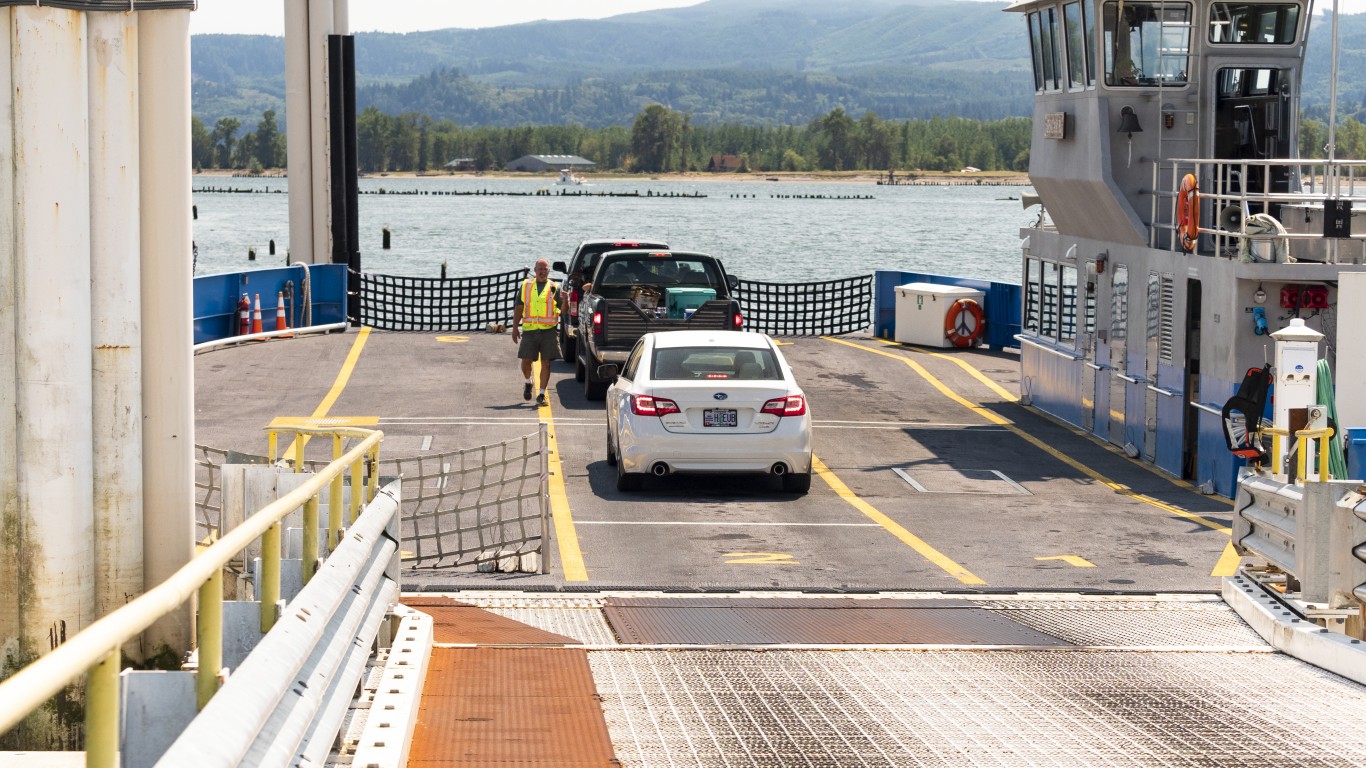
Ferry ridership in the United States increased a solid 11% over the last several years, from an estimated 119 million passengers in 2015 to 132 million passengers in 2019. While some of America’s most popular ferry routes are popular recreation activities – offering scenic views of the Golden Gate Bridge, Alaskan glaciers, or the Statue of Liberty – recent data shows that commuters traveling for work, not pleasure, constitute the bulk of ferry passenger activity.
Ferries operate in diverse areas of the country, serving as public transit alternatives in some of America’s most congested cities as well as critical transport infrastructure connecting island communities to the mainland in coastal regions. While less than 1% of Americans commute on ferries, in some parts of the country ferries are the primary means of transportation to work.
To determine the cities where the most people commute by ferry, 24/7 Tempo reviewed data on commuting practices from the U.S. Census Bureau’s 2021 American Community Survey. Cities, towns, boroughs, villages, and census-designated places were ranked based on the percentage of workers 16 years and over who commute by ferry.
Only the city with the largest percentage of workers commuting by ferry in each county was considered. Places with populations smaller than 500 were not included. We have also included the percentage of those who commute to work by driving. Commuters who use neither method utilize other public transportation, or in some cases simply walk or bike to work. (Supplemental data on median household income and population also came from the 2021 ACS.)
Click here to see the cities where the most people commute by ferry
The U.S. cities most dependent on ferry transport form a unique geographic tapestry of islands and coastal towns within commuting distance of major cities. On historic Daufuskie Island in South Carolina, 70.8% of commuters travel by ferry to work, cruising to nearby Hilton Head Island or Savannah, Georgia.
In Rumson, New Jersey, more than one in five commuters takes the ferry from the Highlands Port into Manhattan, enjoying a direct route into the city and close-up views of the Statue of Liberty, Governors Island, and the Brooklyn waterfront during the ride. From Bainbridge Island in Washington, commuters can ferry across the majestic Puget Sound into Seattle in less time than it would take to drive a car. (Here are 50 towns where commuting takes 10 minutes or less.)
Ferry-dependent communities tend to be more desirable places to live. In 16 of the 20 cities where commuters ferry to work the most, the median home value is higher than the $244,900 national figure. The typical home in Tiburon, California – where ferry passengers can cruise past motorists stuck on the Golden Gate Bridge en route to San Francisco – is over $2 million. Click here to see the most expensive city to live in every state.

20. Port Austin, Michigan
> Commuters taking ferry to work: 3.2%
> Commuters driving to work: 60.6%
> Median home value: $138,200
> Total population: 599
[in-text-ad]

19. St. Ignace, Michigan
> Commuters taking ferry to work: 3.7%
> Commuters driving to work: 83.0%
> Median home value: $114,900
> Total population: 2,041
18. Algonac, Michigan
> Commuters taking ferry to work: 3.9%
> Commuters driving to work: 87.2%
> Median home value: $132,600
> Total population: 4,173
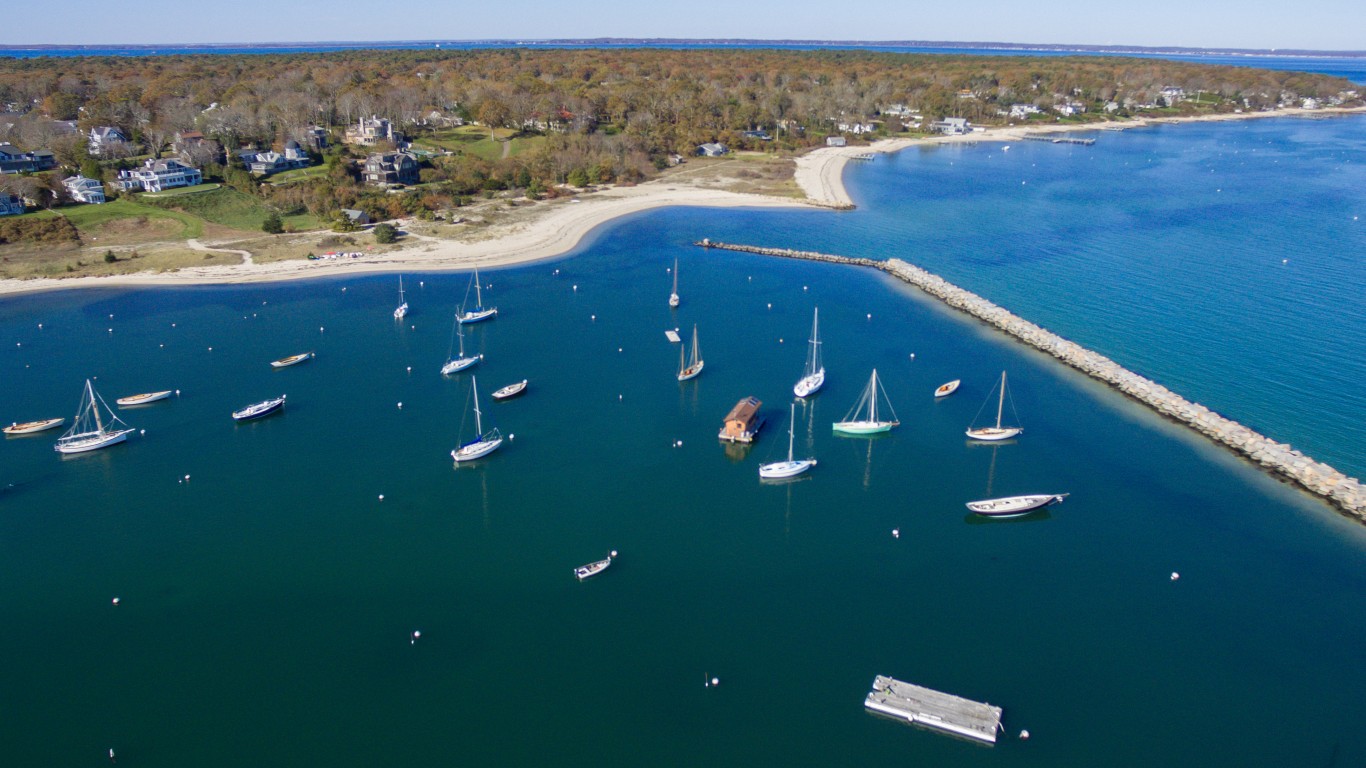
17. Vineyard Haven, Massachusetts
> Commuters taking ferry to work: 4.2%
> Commuters driving to work: 75.8%
> Median home value: $681,100
> Total population: 2,258
[in-text-ad-2]

16. Daniels Farm, Connecticut
> Commuters taking ferry to work: 4.4%
> Commuters driving to work: 78.1%
> Median home value: $483,200
> Total population: 5,764
15. Coupeville, Washington
> Commuters taking ferry to work: 5.1%
> Commuters driving to work: 66.6%
> Median home value: $394,600
> Total population: 1,937
[in-text-ad]

14. Hoboken, New Jersey
> Commuters taking ferry to work: 5.2%
> Commuters driving to work: 21.1%
> Median home value: $777,600
> Total population: 59,369
13. Silverado Resort, California
> Commuters taking ferry to work: 5.6%
> Commuters driving to work: 60.3%
> Median home value: $1,176,000
> Total population: 926
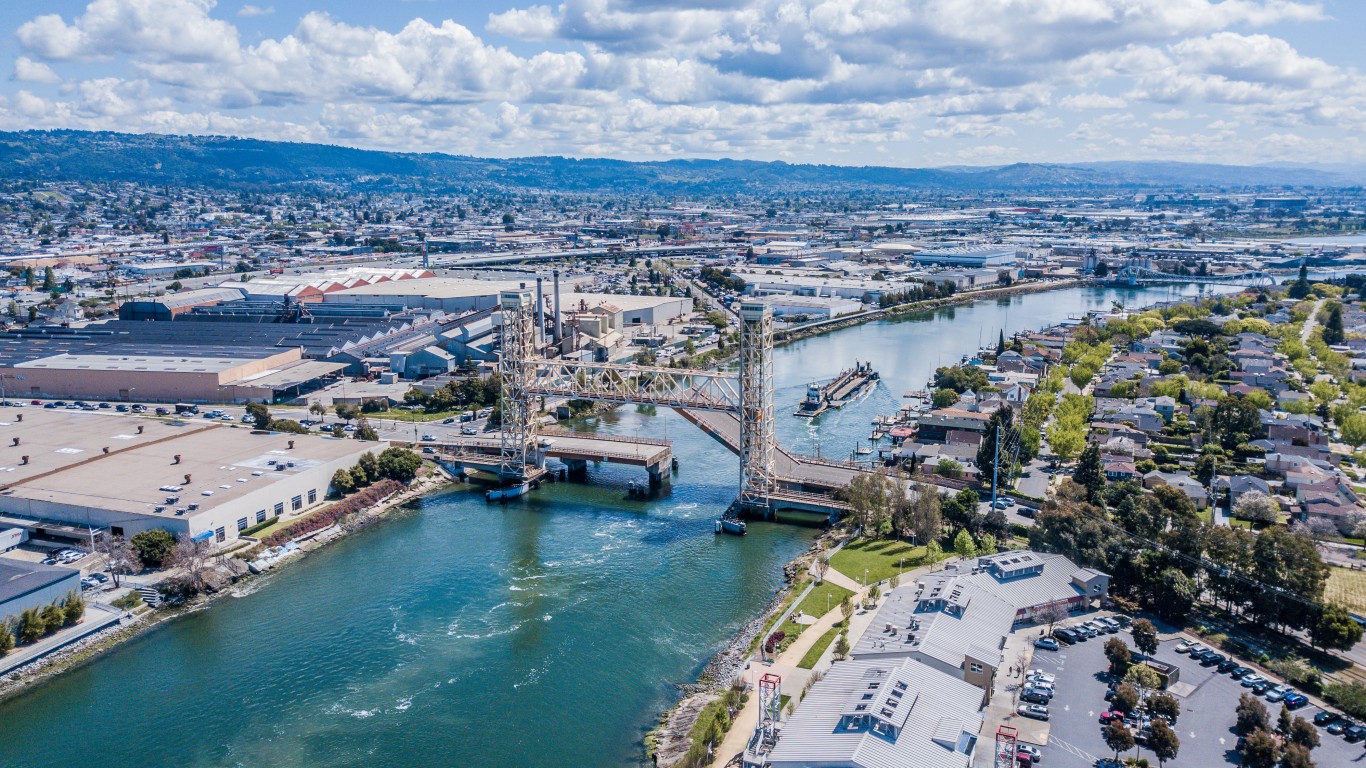
12. Alameda, California
> Commuters taking ferry to work: 5.7%
> Commuters driving to work: 59.7%
> Median home value: $972,800
> Total population: 78,320
[in-text-ad-2]

11. Selawik, Alaska
> Commuters taking ferry to work: 6.8%
> Commuters driving to work: 0.0%
> Median home value: $69,200
> Total population: 659
10. Blue Hill, Maine
> Commuters taking ferry to work: 6.8%
> Commuters driving to work: 75.1%
> Median home value: $346,400
> Total population: 1,401
[in-text-ad]
9. Edgewater, New Jersey
> Commuters taking ferry to work: 8.5%
> Commuters driving to work: 42.9%
> Median home value: $653,000
> Total population: 14,234
8. Vashon, Washington
> Commuters taking ferry to work: 10.3%
> Commuters driving to work: 52.2%
> Median home value: $597,000
> Total population: 10,886
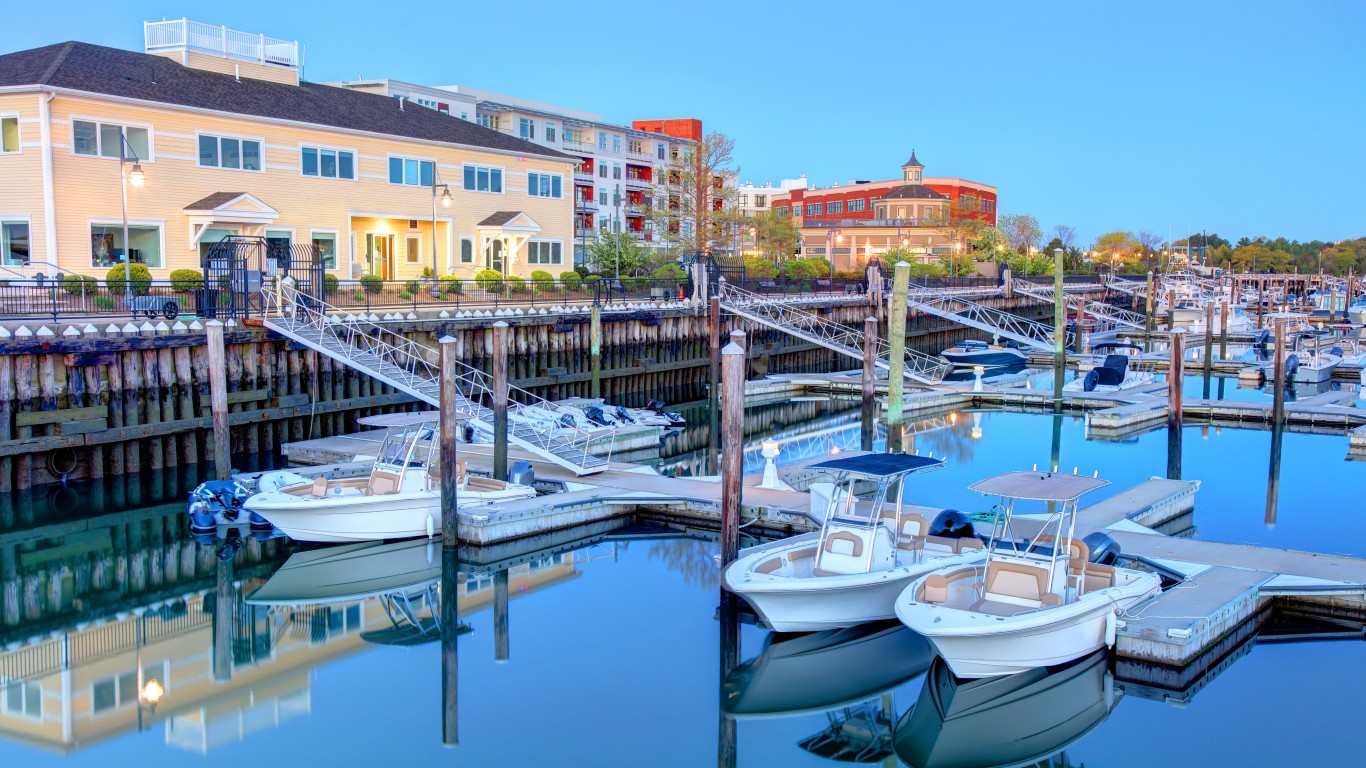
7. Hingham, Massachusetts
> Commuters taking ferry to work: 10.3%
> Commuters driving to work: 51.2%
> Median home value: $1,020,600
> Total population: 5,557
[in-text-ad-2]
6. Shelter Island Heights, New York
> Commuters taking ferry to work: 10.5%
> Commuters driving to work: 59.6%
> Median home value: $876,300
> Total population: 1,162

5. Tiburon, California
> Commuters taking ferry to work: 13.4%
> Commuters driving to work: 54.0%
> Median home value: $2,000,000+
> Total population: 9,146
[in-text-ad]
4. St. James, North Carolina
> Commuters taking ferry to work: 16.0%
> Commuters driving to work: 46.6%
> Median home value: $473,700
> Total population: 6,199

3. Bainbridge Island, Washington
> Commuters taking ferry to work: 19.3%
> Commuters driving to work: 41.9%
> Median home value: $852,700
> Total population: 24,557
2. Rumson, New Jersey
> Commuters taking ferry to work: 20.6%
> Commuters driving to work: 52.1%
> Median home value: $1,309,200
> Total population: 7,292
[in-text-ad-2]

1. Daufuskie Island CDP, South Carolina
> Commuters taking ferry to work: 70.8%
> Commuters driving to work: 15.6%
> Median home value: $295,400
> Total population: 533
100 Million Americans Are Missing This Crucial Retirement Tool
The thought of burdening your family with a financial disaster is most Americans’ nightmare. However, recent studies show that over 100 million Americans still don’t have proper life insurance in the event they pass away.
Life insurance can bring peace of mind – ensuring your loved ones are safeguarded against unforeseen expenses and debts. With premiums often lower than expected and a variety of plans tailored to different life stages and health conditions, securing a policy is more accessible than ever.
A quick, no-obligation quote can provide valuable insight into what’s available and what might best suit your family’s needs. Life insurance is a simple step you can take today to help secure peace of mind for your loved ones tomorrow.
Click here to learn how to get a quote in just a few minutes.
Thank you for reading! Have some feedback for us?
Contact the 24/7 Wall St. editorial team.
 24/7 Wall St.
24/7 Wall St.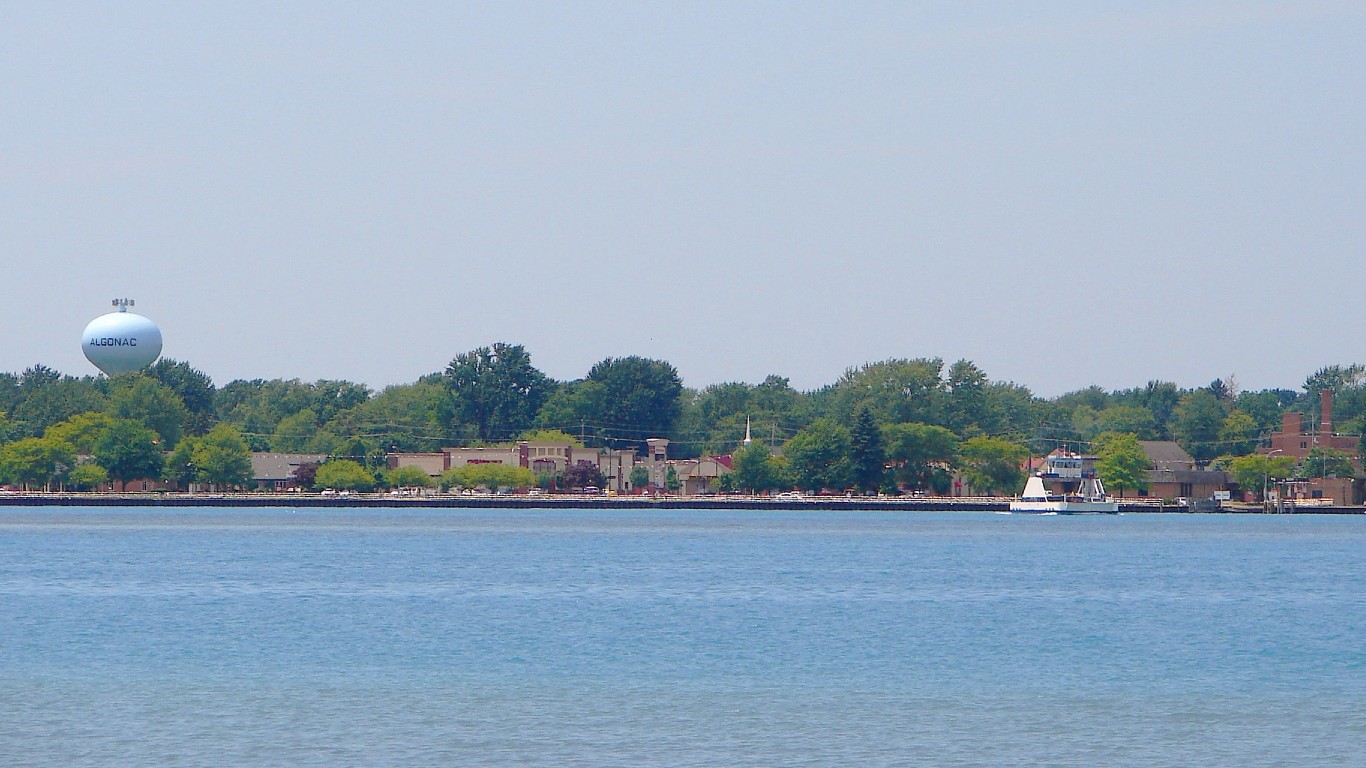

 24/7 Wall St.
24/7 Wall St.

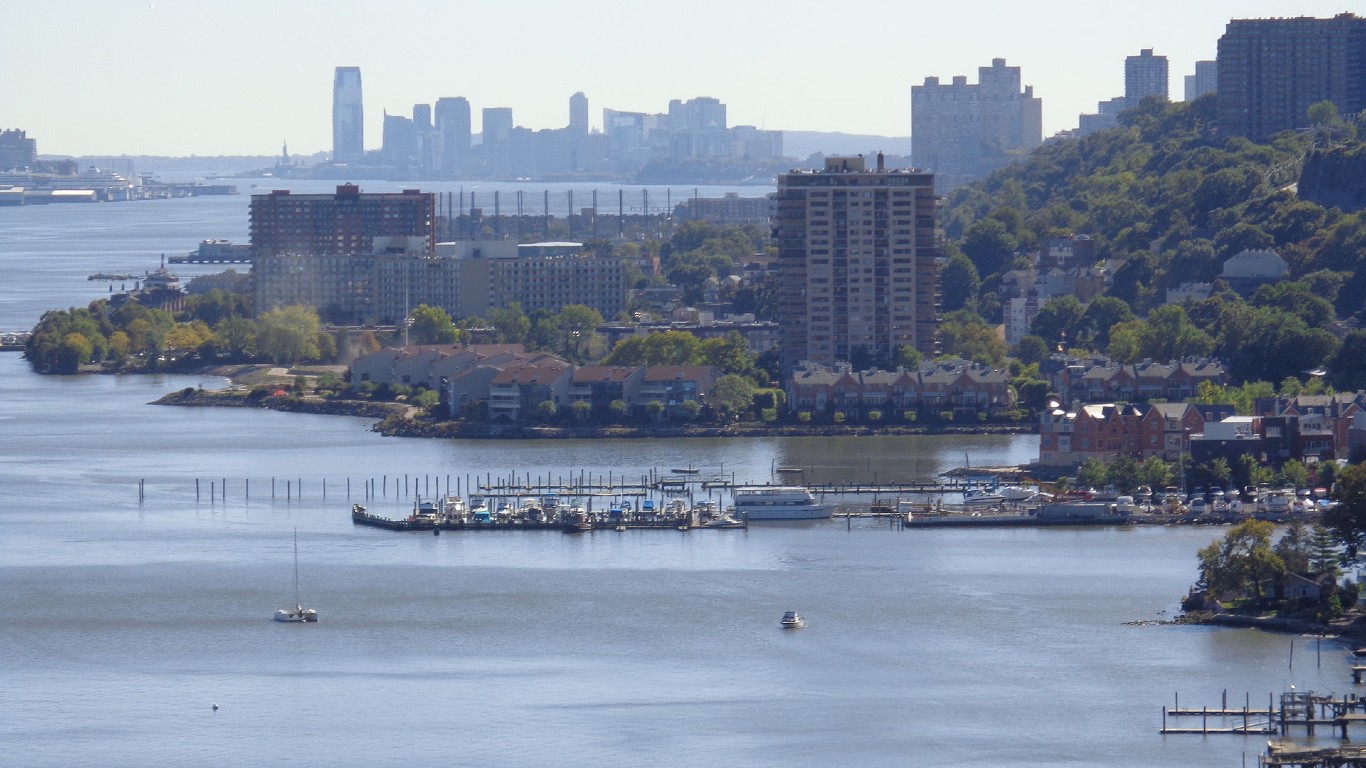
 24/7 Wall St.
24/7 Wall St.




